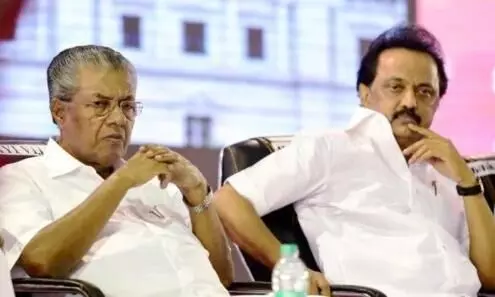
Tamil Nadu, Kerala CMs write PM opposing tabled IAS Rules
text_fieldsDelhi: Chief Ministers of Kerala and Tamil Nadu, following some other CM's, have written to Prime Minister Narendra Modi stating their disapproval of the proposed amendments to the IAS (Cadre) Rules, The News Minute (TNM) reported.
Tamil Nadu CM MK Stalin wrote that the new amendments were strikes to the root of the country's federal polity and state autonomy. They tend to destroy the spirit of cooperative federalism, concentrating powers in the Union government. The Indian Administrative Service has served the nation all these years through a friendly relation between the Union and States, he wrote.
Stalin noted that the state governments already face a deficiency of specific senior officers due to the Union's wrong cadre management policies. State governments have to deal with issues, such as implementing schemes or dealing with natural disasters, with the limited pool of available IAS officers. In such a scenario, forcing statement governments to depute the meagre number of officers will increase the governance deficits in many states. He said that the Union government's lateral entry recruitment also affected officers' morale as some seek deputation of their own will, the Tamil Nadu CM said.
The proposal mandates Union government powers to unilaterally draft the services of officers without their consent and the concurrence of the concerned State government. This will demoralise as well as destabilise the bureaucracy, Stalin said. The officers will be under an endless fear of being penalised by the Centre.
He predicted ominous consequences if the amendments were implemented and added that the Union could not usurp existing provisions to the disadvantage of the State in a federal polity or usurp the powers of the States. He called for the Union to drop the fresh proposals and engage with the state governments.
Kerala CM Pinarayi Vijayan wrote that the federal set-up of India gives equal space for the Union and states even though the Constitution grants the former more jurisdiction on many subjects. The Union government must recognise that two different parties could rule states and the Centre with contrasting ideologies or political views. But both work in the framework of the Constitution.
Thus, if the proposals are implemented, IAS officers might hesitate to enforce state government policies out of fear because the Centre is ruled by an opposition party. The current Deputation Rules are already favouring the Union government the most, and adding the new proposals will further weaken cooperative federalism from the very root, he said and demanded to drop them.
Earlier, CMs of West Bengal, Jharkhand, Rajasthan and Chhattisgarh had written PM opposing the proposed amendments. Odisha, Madhya Pradesh, Bihar and Meghalaya also have opposed them as per reports, TNM says.
Currently, IAS officers pick a cadre when they join service under a state government. If they wish to work with the Union government, they are selected with the consent of the respective states they work for, but the new amendment removes the requirement of the State's consent. The proposed amendment states that the number of officers to de deputed to the Union shall be decided by it, and if any disagreement occurs, the state government has to give effect to the Union's decision in a specified time. The current rule does not mandate such a time limit.























